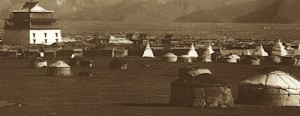Five years or so ago, the late Vera Rich, poet and translator, let slip some ‘Mongolian’ Limericks just for fun. I replied in kind and tickled her. Here’s an exchange or two between us.
Vera:
A Mongolian dealer in koumiss
Told his daughter: “I’m angry with you, Miss!
Last night’s supper was spoiled,
For the tea was not boiled,
And the dumplings were sticky as glue, Miss!”
Me:
His daughter’s voice came from the yurt:
“To say the least, you’re very curt!
No need to be cocky –
Those dumplings were gnocchi,
Green tea is drunk tepid – I’m hurt!”
Apparently Vera wrote a whole series of these as a divertissement at a Mongolian Studies Conference in the 1980s – a far cry from her serious work translating Ukrainian and Belorussian poetry. Here’s some more.
Vera:
Said a PR man in Ulan Bataar,
“I really don’t know what’s the mataar!
But that cursed foreign press
Writes of us less and less,
Saying it has too much else on its plataar!”
Me:
The cleaner (whilst shoving her Huva)
Said, “No Mongol is the prime muva
Of things international.
Anonymity’s rational…
It could be worse – this could be Tuva!”
It does you good to let your hair down once in a while. Vera is very much missed by those of us who knew her and worked with her.
***
Vera Rich(1936-2009)
Educated at St Hilda’s College, Oxford and at Bedford College, London, Vera Rich, a respected science journalist and a tireless campaigner for human rights, was a fine poet. Her wits were quick, her memory prodigious and she had a wonderful sense of humour.
During the 1960’s she had three books of her own poems published, and founded the poetry magazine, Manifold. This ran with some success for 28 issues before publication was suspended in 1968, when Vera became Eastern European correspondent for the science magazine, Nature.
Once asked to translate some Ukrainian poems, she learned the language to do so. For the next three decades, she travelled extensively in eastern Europe, becoming the foremost translator of both Ukrainian and Belarusian poetry into English. She reported on the activities of dissident Soviet scientists, the Chernobyl disaster, psychiatric abuse and AIDS in the Soviet Union. Her anthology of Belarusian poetry, Like Water, Like Fire, published by UNESCO, was subsequently withdrawn under pressure from the Soviet Union.
Manifold, which she revived in 1998, regularly published foreign-language poetry with parallel text in Engtlish and, occasionally. foreign poetry untranslated. In 2006 Vera travelled to the Ukraine to receive the Ivan Franko Award for her 40 years service to the translation of Ukrainian poetry. While on a visit to the Ivan Franko Homestead she gave an emotional reading of Shevchenko’s poem “Testament”. On her next visit in 2007, she wore her medal, the Order of Princess Olha, which had been presented to her at the Ukrainian Embassy in London. Vera could fairly be described as a Ukrainian patriot, an unusual distinction for an Englishwoman.
In 2006 Vera underwent treatment for breast cancer. But she always insisted her illness was an inconvenient obstacle to her work. On 18 December 2009, her doctor advised her to go into hospital, but even then Vera gave priority to her translations. On 20 December, 2009, she died peacefully in her bed. She will be greatly missed, not least for her kindness and the support she gave to so many. Alan Flowers (UK)
***
Marie Marshall (1957 — ) is an Anglo-Scottish author, poet and editor. Her first collection of poems, Naked in the Sea, was published in 2010 and reviewed in Sonnetto Poesia that same year, and her second collection, I am not a fish, in 2013. Since 2005 she has published over two hundred poems, mainly in magazines and anthologies, but the most extraordinary places in which a poem of hers has appeared include on the wall of a café in Wales, and etched into an African drum at the New Orleans Museum of Art. Her first novel, Lupa, was published in 2012. She is well-known in Scotland for her macabre short stories. Her web site can be found at mairibheag.com. Of writing poetry and sonnets she says, “I did not start writing until 2004, so I am very much a twenty-first century writer. I write anything, any kind of poetry that I feel the urge to tackle ― sonnets included.”
